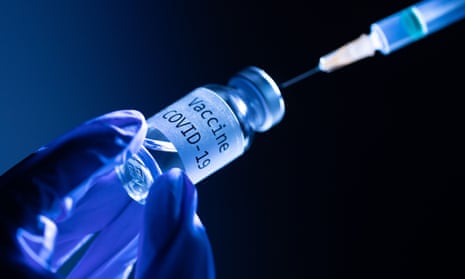The UK will be asked to reconsider its opposition to waiving intellectual property rights for Covid-19 vaccines and treatments at a World Trade Organization meeting on Friday, a move that would allow mass production of treatments and inoculations against the disease and could significantly shorten the length of the pandemic, campaigners say.
India and South Africa have proposed that WTO member states be allowed to waive patents and other intellectual property (IP) rights on any treatments and tools related to Covid-19 until the end of the pandemic, including for the Moderna and Pfizer/BionNTech vaccines that are expected to be approved for use in the coming weeks.
Talks on the proposal will be held again in Geneva on 20 November. Those opposing the move include the UK, US, Canada, Australia and the EU – all of which have reserved billions of doses of potential vaccines through bilateral deals.
If the waiver were adopted, it would allow manufacturers to begin producing Covid-19 vaccines, treatments, diagnostics and any others tools used to fight the disease without fear of being sued or prosecuted.
“You would open your knowledge, data and patents to all the manufacturers around the world who could possibly do this,” said Roz Scourse, a policy adviser with Médecins Sans Frontières (MSF).
Advocacy groups say pharmaceutical companies have received unprecedented taxpayer funding – including $2.5bn (£1.88bn) to Pfizer/BioNTech, $2.48bn to Moderna and $1.7bn to the AstraZeneca/Oxford University candidate, according to MSF – yet retain control over who receives the vaccine, when, and over the price and quantities.
In its statement opposing the waiver at a WTO meeting in October, the UK government said the existing IP system allowed for pharmaceutical companies to voluntarily share data and technology, and some had already done so.
“Beyond hypotheticals, we have not identified clear ways in which IP has acted as a barrier to accessing vaccines, treatments, or technologies in the global response to Covid-19,” the UK’s mission to the trade group said.
“A waiver to the IP rights set out in the Trips [trade-related intellectual property rights] agreement is an extreme measure to address an unproven problem. The UK is of the view that pursuing the proposed path would be counterproductive and would undermine a regime that offers solutions to the issues at hand.”
Companies such as AstraZeneca and Novavax have struck agreements with Gavi, an alliance that aims to increase immunisation in poor countries, and others to share their technology with the Serum Institute of India and the Bill & Melinda Gates Foundation, a deal that will provide at least 200m of either or both candidates to lower-income countries at a ceiling price of $3 per dose.
Moderna has said it will not enforce its patents for the course of the pandemic, while companies such as Johnson & Johnson and AstraZeneca have said they will sell their vaccines at cost price for at least a temporary period.
But campaigners say companies need to waive all IP rights – not just on patents – and disclose the costs behind developing and distributing their vaccines so their not-for-profit pricing claims can be scrutinised.
The global supply of Covid-19 vaccines is likely to be far short of what is required until at least 2024, constrained by limited manufacturing capacity and countries hoarding doses, a study by Duke University in the US said this month. Governments in mostly wealthy states have already reserved more than 3.7bn doses, with negotiations under way for at least another 5bn.
More than 180 countries have signed on to the Covax Facility, a scheme that aims to equitably distribute 2bn vaccine doses by the end of 2021. But the platform will be competing for supplies with countries that have signed direct deals with pharmaceutical companies, and may have to wait until at least some of those are honoured before it starts receiving its first supplies.
“Our assumption right now is that we can get to the 2bn doses [by the end of 2021],” said Seth Berkley, the chief executive of Gavi, one of the groups leading Covax, in a call last week.
“In terms of overall numbers and in terms of timing, that will depend on which vaccines are ultimately successful and whether they are in the pipeline. Our hope, and our attempt, is going to be try to have vaccines available more or less at the same time in developed and developing countries.”
